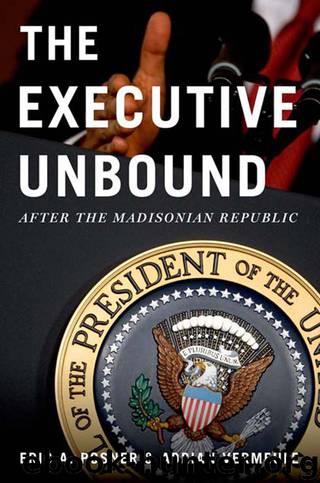The Executive Unbound by Posner Eric A. Vermeule Adrian

Author:Posner, Eric A., Vermeule, Adrian
Language: eng
Format: epub
Publisher: Oxford University Press, USA
Published: 2007-03-10T16:00:00+00:00
Bush I versus Bush II: The Iraqi Threat
George H. W. Bush and George W. Bush both went to war with Iraq, but they faced different threats and chose different responses. George H. W. Bush sought to drive Iraqi military forces out of Kuwait. His problem was persuading the U.S. public that a U.S. military response was justified. In retrospect it might seem that he was clearly right, but at the time the common estimation was that tens of thousands of U.S. troops would be killed.36 This was the expected cost of a military response. On the benefit side, Bush could appeal to the sanctity of sovereign borders, but the public had little sympathy for the rich Kuwaitis. The United States' real concern was that Iraq would, with Kuwait's oil fields, become wealthy and powerful enough to expand its control over the region, threaten Saudi Arabia, dominate the Persian Gulf's oil reserves, and pose a long-term threat to the Western economies and the United States' influence in the Middle East. But all of these concerns are rather abstract, and it was never obvious that the public would accept this scenario. Indeed, the congressional authorization to use military force was far from unanimous in the House of Representatives.37
The credibility of Bush's claims, however, was greatly aided by international support. The public support of nations with divergent interests showed that Bush's claim about the internationally destabilizing effects of Saddam Hussein's invasion was real and not imagined. Thus any claim that a U.S. military invasion was solely in Bush's partisan political interests, or in the interests of oil companies, was seriously weakened. Formal United Nations approval and the military assistance of foreign states—which was of mainly political, not military significance—further solidified Bush's credibility.38
Surface similarities aside, George W. Bush faced a different kind of threat. He feared that Saddam Hussein had weapons of mass destruction, which he would give or sell to terrorist groups like Al Qaeda. It was more difficult for George W. Bush to prove that Saddam had WMDs than for his father to prove that Saddam was a threat to the region, because any WMDs were hidden on Saddam's territory while the invasion of Kuwait could be observed by all. George W. Bush followed the same strategy that his father did, albeit somewhat less enthusiastically: to enlist international support in order to bolster the credibility of his claim that Saddam continued to pose a major threat to U.S. and western interests. But George W. Bush failed to persuade foreign countries that Saddam posed a great enough threat to justify a military invasion (although they largely agreed that he either had or probably had WMDs), and he did not obtain significant international support.39 Ironically, George W. Bush, unlike his father, had strong congressional support, in part because opposition to the first war turned out to be a political liability, and the cost of the first war (unlike the second war) turned out to be low, thanks to the financial contributions of other states and the rapid defeat of the Iraqi army.
Download
This site does not store any files on its server. We only index and link to content provided by other sites. Please contact the content providers to delete copyright contents if any and email us, we'll remove relevant links or contents immediately.
The Secret History by Donna Tartt(19025)
The Social Justice Warrior Handbook by Lisa De Pasquale(12182)
Thirteen Reasons Why by Jay Asher(8882)
This Is How You Lose Her by Junot Diaz(6869)
Weapons of Math Destruction by Cathy O'Neil(6260)
Zero to One by Peter Thiel(5782)
Beartown by Fredrik Backman(5733)
The Myth of the Strong Leader by Archie Brown(5491)
The Fire Next Time by James Baldwin(5422)
How Democracies Die by Steven Levitsky & Daniel Ziblatt(5209)
Promise Me, Dad by Joe Biden(5139)
Stone's Rules by Roger Stone(5078)
A Higher Loyalty: Truth, Lies, and Leadership by James Comey(4946)
100 Deadly Skills by Clint Emerson(4911)
Rise and Kill First by Ronen Bergman(4772)
Secrecy World by Jake Bernstein(4736)
The David Icke Guide to the Global Conspiracy (and how to end it) by David Icke(4696)
The Farm by Tom Rob Smith(4500)
The Doomsday Machine by Daniel Ellsberg(4480)
